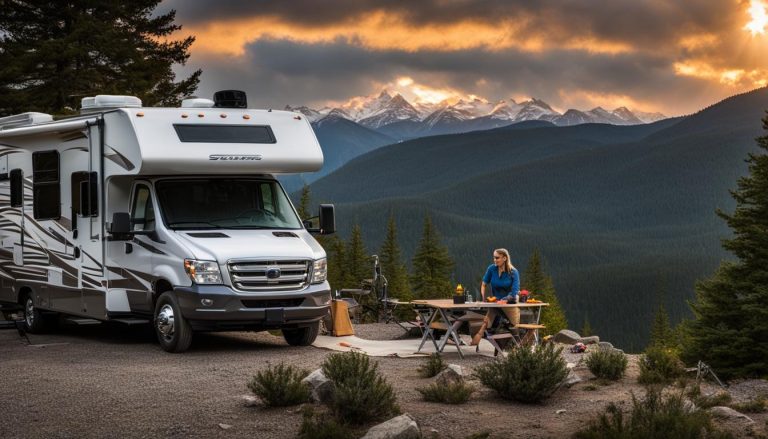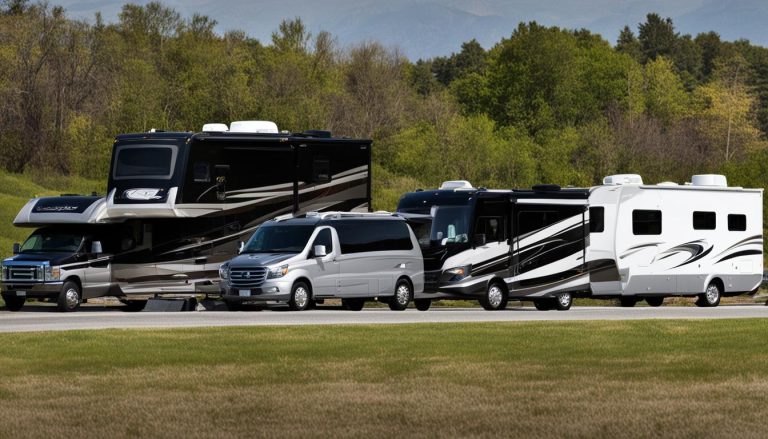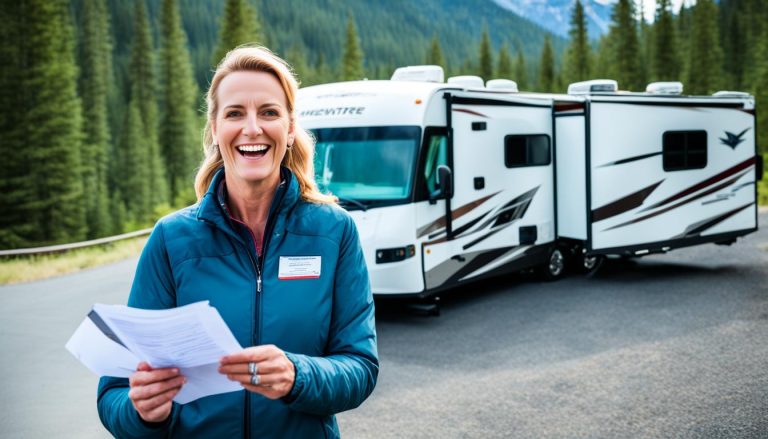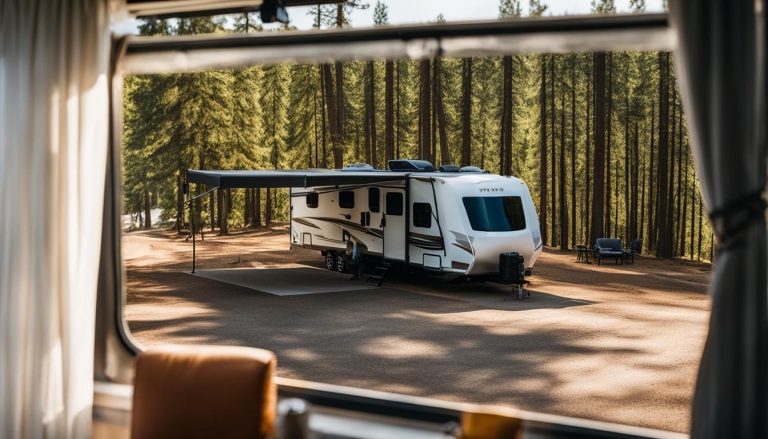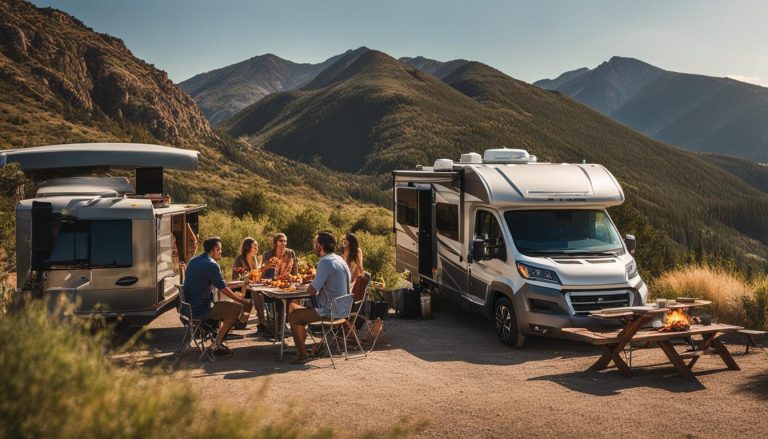Quick Tips: How to Sell My RV Fast
gorvlifestyle.com and its partners may earn a commission if you purchase a product through one of our links
Selling an RV quickly can be a daunting task, but with the right tips and strategies, you can speed up the process and get the best value for your vehicle. Whether you choose to sell it privately, through a dealership, or on a consignment lot, this article will provide you with practical advice on how to sell your RV fast. By following these tips, you’ll be able to attract potential buyers, showcase the value of your RV, and close the deal in no time.
Here are some quick tips to sell your RV fast:
1. Set the right price: Research the market value of similar RVs and price yours competitively. Consider factors such as the age, condition, and features of your RV when determining the price.
2. Advertise effectively: Use online platforms like Facebook Marketplace, Craigslist, and RV-specific websites to reach a wide audience. Highlight the key selling points of your RV in your listing and include high-quality photos.
3. Be responsive: Respond promptly to inquiries and arrange viewings as soon as possible. A quick response time shows potential buyers that you are serious about selling.
4. Showcase your RV: Clean your RV thoroughly, both inside and out, to make it look appealing. Stage the interior to create a welcoming atmosphere, and highlight any unique features or upgrades.
5. Be flexible: Consider negotiating the price or offering added incentives, such as a warranty or accessories, to attract buyers and close the deal quickly.
Key Takeaways:
- Research the market value of your RV and set a competitive price.
- Use online platforms to advertise your RV and include high-quality photos.
- Respond promptly to inquiries and schedule viewings quickly.
- Showcase your RV by cleaning it thoroughly and highlighting its features.
- Consider negotiating the price or offering incentives to attract buyers.
Where to Sell an RV
When it comes to selling your RV, you have several options. You can choose to sell it privately through online listings, such as Facebook Marketplace and Craigslist, where you can set your price and reach a wide audience. Another option is to sell it through a dealership, either as a trade-in or for cash. Dealerships can handle the paperwork and prepare the RV for resale. If you prefer a combination of the two, you can sell your RV on consignment, where a dealership will handle the sale on your behalf while you remain the owner. Each option has its pros and cons, so it’s important to consider your priorities and choose the method that works best for you.
Whether you decide to sell your RV privately, through a dealership, or on consignment, it’s essential to weigh the advantages and disadvantages of each method. Determining your goals, timeframe, and desired level of involvement can help you make an informed decision. Now, let’s dive deeper into each option and explore the best strategies for selling your RV.
Tips for Selling Privately
If you decide to sell your RV privately, there are a few tips that can help you attract potential buyers and sell your RV quickly. One important tip is to choose the right timing for selling your RV. Typically, the online RV sales peak in January and February, so listing your RV during these months can maximize your chances of attracting buyers.
Additionally, make sure to take high-quality photos of your RV to showcase its features and condition. Bright, staged, and detailed photos can generate more inquiries and make your listing stand out. Timing and good photos are key to selling your RV privately.
Here are some additional tips for selling your RV privately:
- Create a compelling listing: Provide a detailed description of your RV, highlighting its unique features and any recent upgrades. Be honest and transparent about the condition of your RV to build trust with potential buyers.
- Set a competitive price: Research the market value of similar RVs and set a price that is attractive to buyers while still allowing you to achieve your desired selling price. Consider factors such as age, condition, and mileage when determining the price.
- Promote your listing online: Utilize online platforms such as RV-specific classified websites, social media groups, and online forums to maximize your reach. Include relevant keywords in your listing to improve its visibility in search results.
- Respond promptly to inquiries: Be proactive and responsive when communicating with potential buyers. Answer any questions they may have and provide additional information or photos upon request.
- Arrange a safe and convenient viewing: Once you have interested buyers, schedule viewings at a mutually convenient location. Ensure the RV is clean and presentable for these appointments.
- Negotiate and close the deal: Be prepared to negotiate the price and terms of the sale. Stay firm on your bottom line but be willing to compromise to close the deal. Once an agreement is reached, make sure to complete the necessary paperwork and transfer the ownership properly.
By following these tips and strategies, you can increase your chances of selling your RV privately and getting a fair price. Remember, effective marketing, good timing, and attention to detail can make all the difference in attracting potential buyers and closing a successful sale.
Benefits of Selling to a Dealership
Selling your RV to a dealership can offer several advantages, especially if you’re looking for a quick and hassle-free sale. Here are the key benefits of choosing to sell your RV to a dealership:
- Cash payment or trade-in option: Dealerships can provide immediate cash payments for your RV, allowing you to quickly access the funds. Alternatively, if you’re planning to upgrade to a new RV, dealerships often offer the option to trade-in your current RV, which can help offset the cost of your new purchase.
- Time and effort savings: Dealerships take care of all the necessary paperwork involved in selling an RV, saving you valuable time and effort. They also handle the preparation of the RV for resale, ensuring it’s in optimal condition for potential buyers.
- Effective marketing and extensive buyer network: Dealerships have a wide network of potential buyers who are actively looking for RVs. By selling to a dealership, you can tap into this network and increase your chances of finding a buyer quickly. Dealerships also have effective marketing strategies in place to showcase your RV to potential buyers.
While selling to a dealership offers these advantages, it’s important to consider the potential trade-offs. One important consideration is that the price offered by a dealership is typically lower than what you could get selling your RV privately. However, this is often outweighed by the convenience and speed of the sale provided by a dealership.
If you’re looking for a quick, hassle-free sale and value the convenience and support that a dealership can offer, selling your RV to a dealership may be the ideal choice for you.
| Pros of Selling to a Dealership | Cons of Selling to a Dealership |
|---|---|
| Immediate cash payment | Lower price compared to selling privately |
| Trade-in option for a new RV | |
| Time and effort savings on paperwork and preparation | |
| Access to the dealership’s extensive buyer network |
Exploring RV Consignment
If you’re considering selling your RV, exploring the option of RV consignment can provide you with a convenient and effective way to sell your vehicle. Consignment involves partnering with a third-party dealership or consignment lot to handle the sale of your RV on your behalf while you retain ownership.
When you choose RV consignment, the consignment lot will assist you in getting your RV ready for sale. This may include tasks such as cleaning, maintenance, and any necessary repairs to ensure your RV is in optimal condition. They will also take care of marketing your RV to potential buyers, handling showings, and managing the paperwork involved in the sale. With the consignment lot’s expertise and resources, the process becomes more convenient and streamlined for you.
While RV consignment offers many advantages, it’s important to be aware of the consignment fees associated with this selling method. Consignment fees typically range from 10-15% of the final sale price. Additionally, there may be a consignment window, which is a specific timeframe during which your RV needs to sell. Understanding these financial considerations and time constraints will help you make an informed decision when deciding if RV consignment is the right choice for you.
Pros of RV Consignment:
- Convenient and time-saving, as the consignment lot handles the entire selling process on your behalf
- Expertise and resources of the consignment lot help attract potential buyers and sell your RV more efficiently
- Your RV is professionally cleaned, maintained, and marketed to showcase its value
Cons of RV Consignment:
- Consignment fees range from 10-15% of the final sale price
- There may be a consignment window during which your RV needs to sell
By considering both the pros and cons of RV consignment, you can make an informed decision about whether this selling method aligns with your selling goals, timeline, and financial preferences.
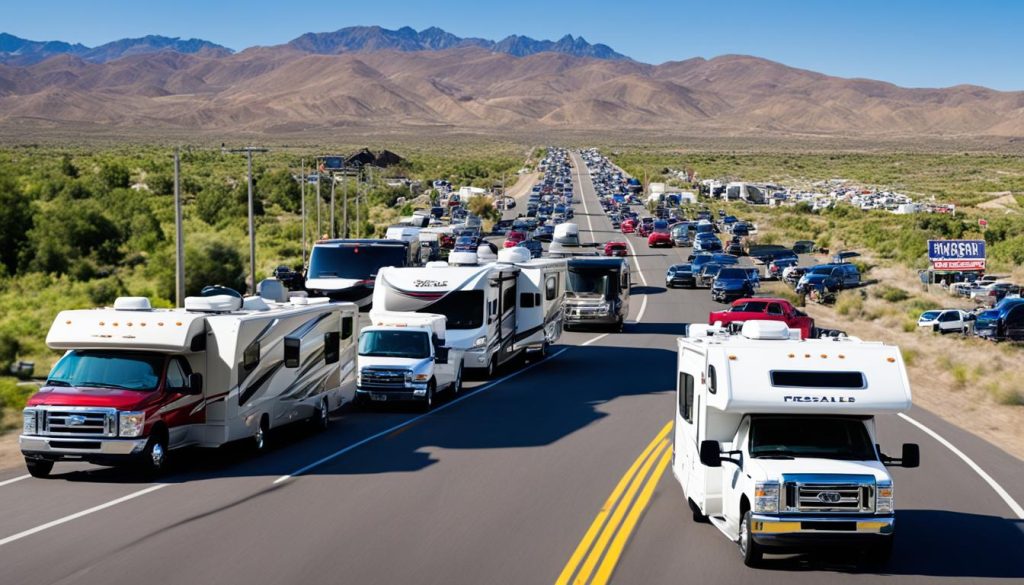
Preparing Your RV to Sell
Before listing your RV for sale, it’s important to prepare it properly to attract potential buyers and maximize its value. Follow these steps to ensure your RV is in top shape:
- Clean your RV: Start by giving your RV a thorough cleaning, both inside and out. Remove any clutter, dust surfaces, and vacuum the floors. Consider hiring a professional detailing service for a more polished look.
- Fix broken parts: Check your RV for any broken or damaged parts. Repair or replace them to ensure everything is in working order. This could include fixing leaky faucets, replacing broken knobs, or repairing damaged screens.
- Check the mechanics and systems: It’s crucial to ensure that all the mechanical and electrical systems in your RV are functioning properly. Test the lights, air conditioning, heating, and plumbing to make sure everything is in working condition.
Additionally, if your RV has an engine, have it serviced by a qualified mechanic. Mention this in your listing to assure potential buyers that the engine has been well-maintained.
By taking the time to prepare your RV, you can increase its appeal and value. A well-maintained and clean RV is more likely to attract buyers and secure a fair price.
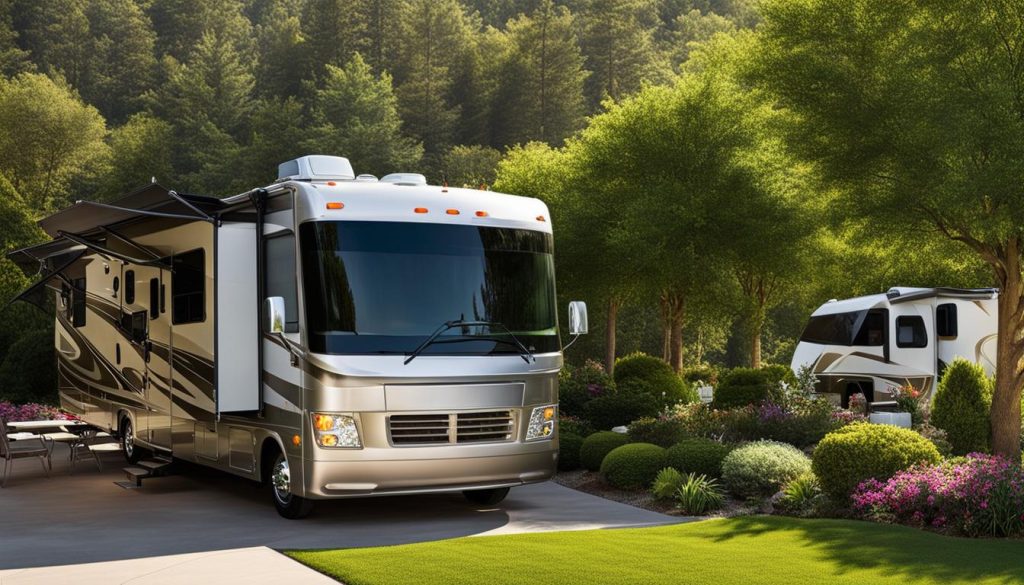
Example Table: Maintenance Checklist
| Area | Task |
|---|---|
| Exterior | Clean and wax the exterior |
| Interior | Remove clutter, vacuum, and dust |
| Appliances | Test and repair or replace malfunctioning appliances |
| Plumbing | Check for leaks and ensure faucets and toilet are working |
| Electrical | Test all lights, switches, and outlets |
| Tires | Check tire pressure and tread |
| Engine (if applicable) | Have engine serviced by a qualified mechanic |
By following this checklist, you can ensure that your RV is in the best possible condition before selling.
Choosing the Best Selling Strategy
Now that you have considered the different selling options and tips, it’s time to choose the best selling strategy for your RV. Evaluating the advantages and disadvantages of each method and considering your priorities and objectives is crucial in making an informed decision.
If convenience and a quick sale are your top priorities, selling to a dealership may be the right choice for you. Dealerships offer the convenience of handling paperwork and preparing your RV for resale. However, keep in mind that the price offered by a dealership is usually lower than what you could get through a private sale or consignment.
If maximizing profit and retaining control over the selling process are important to you, selling privately may be the best option. Selling on your own gives you the freedom to set your price and negotiate directly with potential buyers. However, it requires more time, effort, and marketing skills to attract interested parties.
Consignment offers a middle ground, blending convenience and ownership control. When you choose consignment, a dealership will handle the sale on your behalf while you maintain ownership. This option allows you to benefit from professional marketing and sales expertise, without being directly involved in the process. Just be aware that consignment fees typically range from 10-15% of the final sale price, and there may be a consignment window during which your RV needs to sell.
FAQ
How can I sell my RV quickly?
To sell your RV quickly, consider selling it privately through online listings, selling it to a dealership, or consigning it at a lot. Each option has its pros and cons, so choose the method that works best for you.
Where can I sell my RV?
You can sell your RV privately through online listings such as Facebook Marketplace and Craigslist, sell it to a dealership, or consign it at a consignment lot.
What are some tips for selling my RV privately?
Choose the right timing for selling your RV, such as listing it in January and February when online RV sales peak. Take high-quality photos of your RV to showcase its features and condition, and make your listing stand out.
What are the benefits of selling my RV to a dealership?
Selling your RV to a dealership can offer a quick and hassle-free sale. Dealerships can offer cash payments or the option to trade-in your RV. They handle the paperwork and prepare the RV for resale, saving you time and effort.
What is RV consignment?
RV consignment is when you use a third party, such as a consignment lot, to handle the sale of your RV while you remain the owner. The consignment lot will help prepare and market your RV, handle showings and paperwork on your behalf.
How should I prepare my RV to sell?
Give your RV a thorough cleaning both inside and out, fix any broken parts or perform necessary maintenance, and have the engine serviced if applicable. A well-maintained RV is more likely to attract potential buyers and command a fair price.
How do I choose the best selling strategy for my RV?
Evaluate the advantages and disadvantages of each selling method, consider your priorities and objectives, and choose the method that aligns with your needs. Selling to a dealership prioritizes convenience, selling privately maximizes profit and control, and consignment offers a middle ground.

